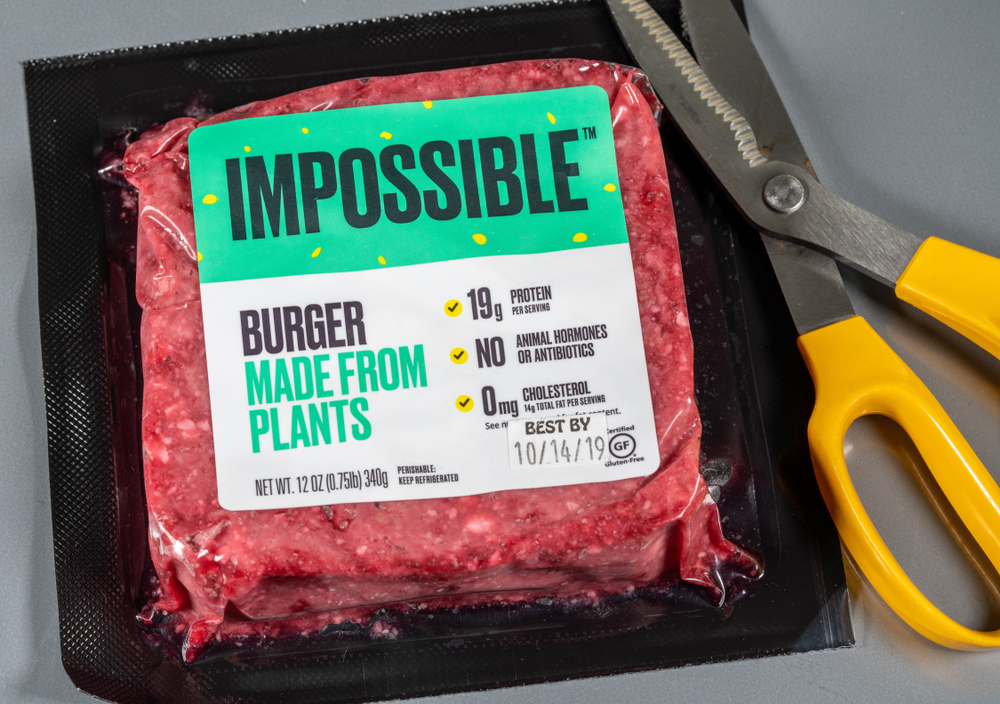If you’ve tried an Impossible Burger at Burger King you know why meat producers might feel threatened by this plant-based burger. It’s not bad. Not bad, at all.
But this isn’t a burger review. It’s a story about what lengths the meat industry is going to stem the competition from increasingly sophisticated plant-based meat alternatives.
According to the Plant-Based Food Association, last year legislatures in more than half the states introduced some form of legislation requiring plant-based food manufacturers to beef up the labeling on their plant-based meat alternatives. They say it’s to keep consumers from being confused and buying plant-based meat alternatives instead of the animal meat they really want. The plant-based food industry says the laws are meant to corral their business.
The latest legal skirmish over plant-based meat alternatives is in Oklahoma, where this year the governor signed into law the HB 3806 — “The Oklahoma Consumer Meat Protection Act.” The new law requires companies that produce plant-based alternatives to meat to include on their labels the word plant-based in a font at least as big as the name of the product.

“Clever marketing practices and deceptive labeling on plant-based meat alternatives can be confusing for shoppers looking to purchase meat-based items at the grocery store,” state Sen. Micheal Bergstrom said in a news release when the Oklahoma bill was signed into law. “HB 3806 ensures clarity and accuracy of labeling meat and plant-based food items, giving consumers peace of mind that they are purchasing exactly what they intended.”
Bergstrom could not be reached for further comment.
The Institute for Justice, a Washington-based organization that sues on behalf of individuals and groups it believes have had their constitutional rights violated, filed for a preliminary injunction on behalf of Upton Foods in Chicago and the Plant-Based Food Association to stop the law from taking effect. The Institute for Justice argued that the labeling law was a violation of the First Amendment. The request for a preliminary injunction was rejected in late November. So, the Consumer Meat Protection Act is now the law of the land in Oklahoma.
RELATED: Need to track your lawsuit? There may be an app for that.
RELATED: Macy’s being sued over facial recognition software
Institute for Justice attorney Milad Emam said they will be appealing the request for a preliminary injunction to the Tenth Circuit Court of Appeals on the same grounds — that it’s a violation of their clients’ First Amendment right to design truthful packaging not dictated by their competition. The Institute for Justice argues that the Oklahoma law puts an undue financial burden on a little vegan food producer like Upton, which will now have to create separate packaging for Oklahoma or pull out of the market altogether.

Michele Simon of the Plant-Based Food Association said “It’s impossible for every company to have a different label for every state, no matter what the size of the company is. It is an insane and ridiculous burden and no company operates that way.”
Upton’s products are clearly labeled “100% vegan. Making them change their label to make that vegan identification as big as the product’s name serves only one purpose,’’ according to Simon. “There’s no legitimate policy reason for this. It’s simply members of the cattlemen’s lobby go to their friends in the state legislature and make noise and say, oh my god, Beyond Meat is in Carl’s Junior and the Impossible Burger is in Burger King. We must stop this at once.
“Instead of just letting the consumers dictate what happens in the marketplace, they’re trying to put their thumbs on the scales and get their friends in state legislators to tip the scales in their balance by legislating these ridiculous font size changes.”
But Oklahoma meat producers don’t see it that way. Roy Lee Lindsey, Executive Director of the Oklahoma Pork Council, said in a news release that “The Oklahoma Pork Council appreciates the work of the legislature to approve HB 3806 relating to labeling products as ‘meat.’ Common sense tells us that for plants to become ‘pork’ those plants must be fed to a pig.’’
In the case of Upton’s plant-based products, the packaging doesn’t use the word pork. They use the word bacon and chick. But, again, their packaging says the product is 100% vegan.
The Plant-Based Food Association’s Simon says there just isn’t anything to protect consumers from by having this Oklahoma Meat Consumer Protection Act.
“Consumers have no idea and don’t care about the Oklahoma Cattlemen’s Association and their juvenile complaints to the legislature,” Simon said. “Consumers are happy to be enjoying an Impossible Burger or Upton’s or whatever the brand is. The consumers are opting for these plant-based alternatives and they’re very happy to do it. They’re not going to stop doing that because the Oklahoma Cattlemen’s Association is upset about it.”
Ultimately, Simon says she thinks this is as much of a philosophical battle as a legal one.
“Let’s face it, Americans like a good burger. It’s just an American icon,” Simon said. “We can hope and pray that people eat more vegetables. And, we certainly know Americans need to eat more vegetables. But the truth of the matter is we also need to give them alternatives to the meat they know and love and are familiar with and really are not going to stop eating because some dietician is telling them to eat more salad. So, the idea is to give them a good tasting, healthier, more sustainable alternative than a conventional animal burger.”
Simon said meat-alternative producers are not trying to force consumers to eat plant-based products, they just think consumers should have the option.
“We’re not trying to tell people what to do and were certainly not trying to push the meat industry out of the market,” Simon said. “They love to say ‘we’re not trying to push the plant-based food companies out of the market.’ But, they want to have those companies have one hand tied behind their back to put it on the market. How products are labeled and how they’re positioned in the marketplace is a key driver to consumer acceptance and understanding. So, what we’re saying is let the marketplace decide. The consumer isn’t being deceived. Take your product out there and compete.”














